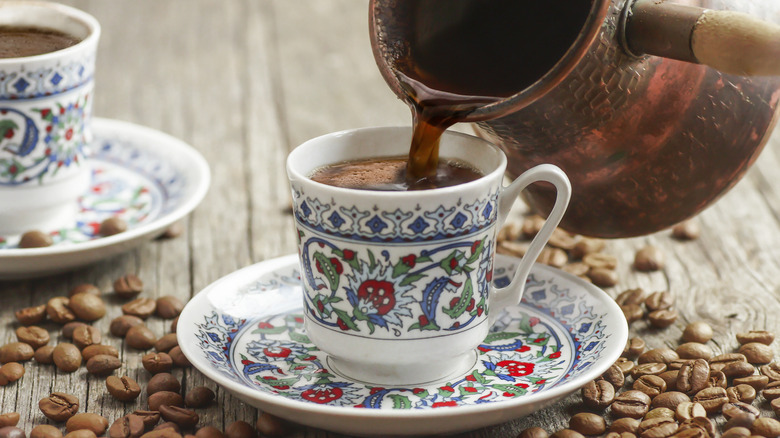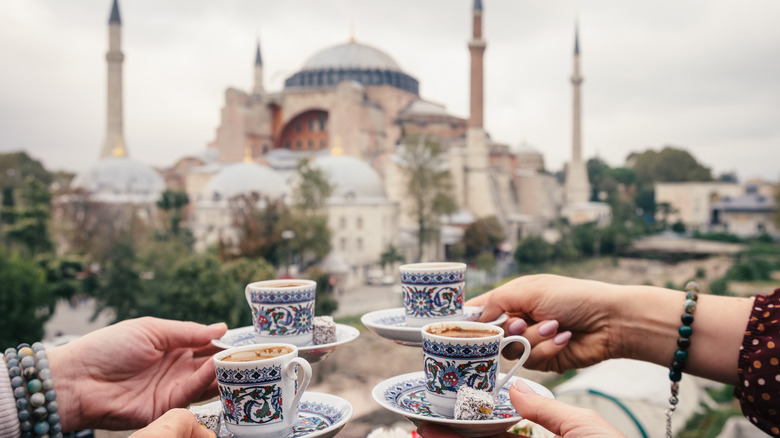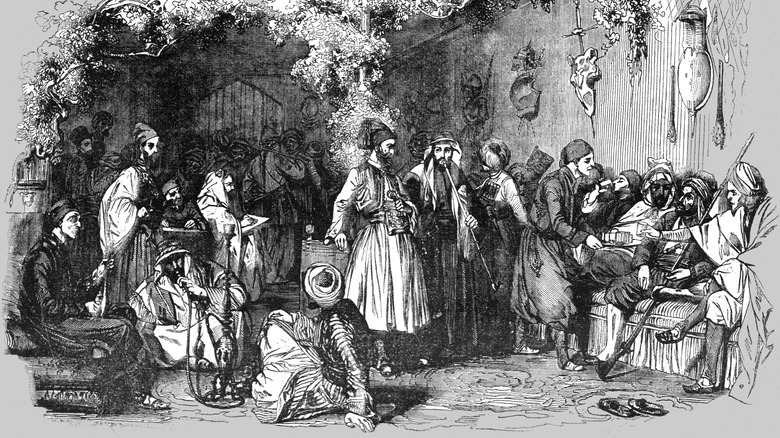In 17th-Century Turkey, Drinking Coffee Could Get You Killed
If you're anything like the majority of Americans — 62% of them, to be specific — then you drink coffee every single day (via National Coffee Association). Personally, we can't think of a better way to start the morning than with a dark, rich, fragrant mug of this brew that comes in about as many forms as there are palates, from strong cold brew to a milky cappuccino to a straightforward shot of espresso.
And although coffee fads come and go, one thing that never ebbs is the bean's popularity. Native to Ethiopia — where the ceremony of roasting, grinding, and brewing small, strong cups of coffee is still a pervasive social tradition (via Culturally Ours) — coffee began its global conquest around the 15th century, starting with cultivation in the Arabian Peninsula. A century later, it had spread to the countries of Iran, Egypt, Syria, and Turkey (via National Coffee Association). And although we might typically think of coffee as a European-style drink — what with the prevalence of Italian monikers such as latte, macchiato, and the like — the dark brew remains integral to many Middle Eastern traditions, widely consumed in social settings and often served at official gatherings at which business contracts, wedding arrangements, and even feuds are discussed (via Kopi Luwak Direct). Coffee has reigned in the Arab world for more than 600 years, but has nevertheless been a dangerous pursuit there at certain points in history.
This 1600s Ottoman sultan decreed death on those who drank coffee
Other than that morning cuppa to get your day going, what does coffee drinking usually look like in your life? If you think about it, it's mostly a social activity: How often do you, say, meet a friend at a coffee shop to dish, or linger over big mugs long past brunchtime's end? Coffee has always been a social drink, and according to Atlas Obscura, it was coffee's social nature that got it banned at several points in the history of the Middle East. Starting in the Middle Ages, coffeehouses became important social gathering places for Arabs from all walks of life, the National Coffee Association explains, the ideal spot to chat, gossip, play chess, and listen to music. And, of course, to discuss politics.
This tendency of the common folk to sip coffee and — heaven forbid! — plot revolution was what motivated the Ottoman sultan Murad IV to ban the consumption of coffee across his empire in 1633. Making the crime punishable by death, legend has it, according to Atlas Obscura, that the sultan himself would stalk the streets of Istanbul turkey in disguise, unsheathing his 100-pound broadsword to decapitate any offending sippers he found. Despite the ban and its threats of execution, coffee drinking didn't decline, but rather continued to surge.
Coffeehouse were a place for plotting
These days, those of us gathering at coffee shops with our friends might be more inclined to discuss topics like the weather, work, and relationships than those such as, say, revolution. But the latter topic was a common one in the past: After all, both the French and American Revolutions were planned, in part, in coffeehouses, according to NPR. Therefore, the Ottoman sultan's concerns — and those of other rulers throughout history who have banned coffee – from King of Prussia Frederick the Great to the archbishop of Cologne Maximilian Frederick — were definitely legitimate.
"Coffee has a tendency to loosen people's imaginations ... and mouths," Mark Pendergrast, author of "Uncommon Grounds: The History of Coffee and How It Transformed Our World," told NPR. In a pre-internet world — where coffeehouses necessarily became public forums for conversation and debate — coffee was, indeed, a politically dangerous substance.


